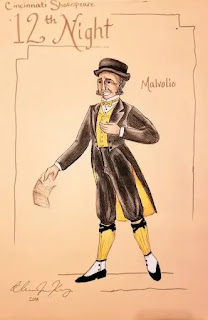Character sketch of Malvolio
Olivia’s puritanical steward Malvolio is the most complex and the most interesting character in Twelfth Night. Though not ‘essentially ludicrous’-(Charles Lamb) as comic characters generally are, Malvolio is far above the conventional gulls. He is branded as ‘sick’ of ‘self-love’. Olivia recognises this defect in Malvolio and says, “O you are sick of self-loveMalvolio (1.v.97). Maria amplifies this description by calling him “an affectioned ass… the best persuaded of himself, so crammed as he thinks with excellences that it is his ground of faith that all that look on him love him”, ( II. ii, 162-167). This self-love begets self-conceit and vanity. He is fault-finding with other people. He judges others by the lofty standard of his own imaginary excellence. He thinks that because he is virtuous there shall be no more cakes and ale. He stops sir Toby’s midnight revels with a haughty reproof. He censures him and bids him “amend his ways”. He is offended by the sallies of Feste and calls him “a barren rascal”. He puts Fabian out of favour on account of bear-baiting. This self-esteem is encouraged by his position. In dress and deportment, he cultivates what he fondly imagines to be a grand style. He wears yellow stockings and cross-garters; he plays with his chain of office; he practices behaviour to his shadow in the sun, and “cons state without book and utters it by great swarths”. Maria thinks that if he does go mad has to be confined, “the house will be the quieter”.
Malvolio is easily led to believe that others are in love with him because of his self-love and vanity. A hint from the mischievous Maria has been enough to encourage ideas that Olivia’s feeling from him is a tender kind. The idea brings with it a rapturous vision of ‘Count Malvolio’ in his branched velvet grown and lording it over all the servants and rebuking his “Kinsman Sir Toby”. Maria’s letter forging the handwriting of Olivia encourages the idea. He hastens to cast his humble slough and parades before his mistress in his cross garters and forces his austere countenance into the curves of an unnatural smile. Thus he becomes a ludicrous figure. Olivia describes this behaviour as ‘midsummer madness. Sir Toby, Maria and Fabian make harsh comments on his behaviour and ridicule him. Sir Toby declares him to be a mad man and imprisons him in a dark room.
Malvolio pays the penalty for his self-love, vanity and puritanical attitude. Yet his humiliation has a kind of tragic interest. He is confined in a dark room in chains. Insult is added to injury when the fool, under the disguise of Sir Topas affects to lay the fiend that has sheltered himself in the godly heart. Malvolio says: “There was never a man so notoriously abused”. Subsequently, Olivia says very much the same thing about the way Malvolio has been treated. Fabian explains that they have grudge against Malvolio for his discourteous behaviours to them and that Maria had written the letter at Sir Toby’s advice. Fabian’s explanation would have been satisfactory had they only ridiculed Malvolio and exposed him in a cruel manner. So there is a feeling that Malvolio is more Sinned against than sinning. We cannot agree with Fabian that the treatment was only ‘sportful malice’. When the clown lashes Malvolio with brief quotations from Maria’s letter, Malvolio makes his exit angrily, saying: I’ll be revenged on the whole pack of you.”
Malvolio is a comic character. His self-conceit, his Puritanism, his austere manners and his overstretched morality make him a butt of ridicule. He behaves in a manner that provokes laughter because of the contrast between what he professes and what he really is. His self-love and vanity lead him to think in a way that is opposite to what he is. He is misled by self-love to give exaggerated importance to his own person and character and so it is not difficult to make him a common recreation”. Lamb rightly observes: “His quality is at best unlovely, but neither buffoon nor contemptible. His bearing is lofty, a little above his station, but probably not much above his deserts… Even in his abused state of darkness and the chains, a sort of greatness seems never to desert him. He argues highly and well with the supposed Sir Topas, and philosophises gallantly upon his straw”. The man who is notoriously abused can think clearly and unfalteringly is not a Buffon and should not be identified with the eternal low standard of comedy. Prof. Sengupta has observed: “It is the same man who, in different situations and under different impulses becomes severe, puritanical, dignified, respectable self-complacent and ridiculous.”
#character_sketch_of_malvolio
